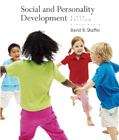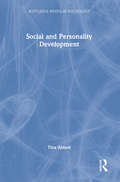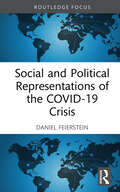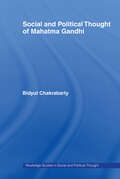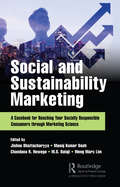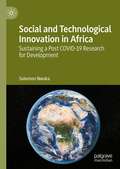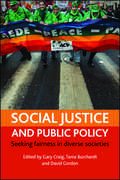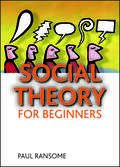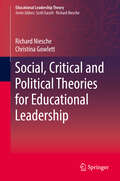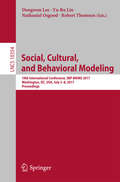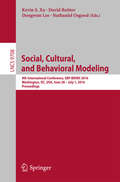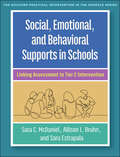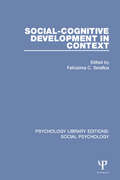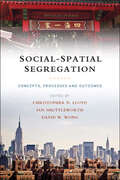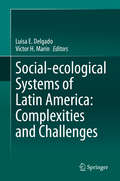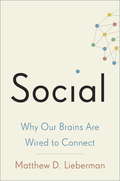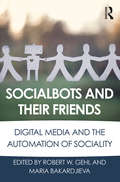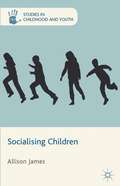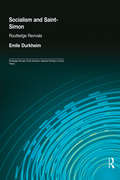- Table View
- List View
Social and Personality Development (6th Edition)
by David R. ShafferThe 6th edition of Social and Personality Development features clearly written, current coverage of social and personality development that aids students in discovering the causes, processes, and complexities that underlie developmental change.
Social and Personality Development (Routledge Modular Psychology Ser.)
by Tina AbbottSocial and Personality Development looks at the processes by which we come to be who we are. It covers a range of topics central to personality and developmental psychology. The book is arranged in three sections, the first covering the main theories of personality, the second describing the development of gender and the third focusing on adolescence. It is suitable for the AQA-A A2 Level examination, but will also be of interest to those studying education, nursing and other related disciplines.
Social and Political Representations of the COVID-19 Crisis (The COVID-19 Pandemic Series)
by Daniel FeiersteinWeaving together political, sociological, psychological and epidemiological analyses, Social and Political Representations of the COVID-19 Crisis provides revealing insights into the transformations wrought by the pandemic and the social divisions it has exposed. Accounting for the realities of the pandemic across the globe, with a strong focus on experiences in the Global South, this book challenges readers to question their beliefs about the societies they live in and how these societies should respond to collective catastrophes. Originally published in Spanish, this English edition is thoroughly revised and updated. Social and Political Representations of the COVID-19 Crisis analyses the varied strategies attempted in different parts of the world to deal with the pandemic, including elimination, mitigation, flattening the curve, and herd immunity, and the ramifications of these approaches. It argues that the different strategies are guided by social representations that can be analysed on epistemological, emotional and ethical-moral levels. Drawing upon a wide range of thinkers, the book also investigates the key role of psychological defence mechanisms, including different ways of denying the seriousness of the pandemic and different paranoid responses to pain and frustration, such as scapegoating and conspiracy theories. This timely book analyses the transformations in the social fabric brought about by the pandemic and the questions it poses for the future of our societies. It will therefore be of great interest to students and researchers in the humanities, social sciences, and public health as well as the general reader.
Social and Political Thought of Mahatma Gandhi (Routledge Studies in Social and Political Thought #Vol. 43)
by Bidyut ChakrabartyDuring his campaign against racism in South Africa, and his involvement in the Congress-led nationalist struggle against British colonial rule in India, Mahatma Gandhi developed a new form of political struggle based on the idea of satyagraha, or non-violent protest. He ushered in a new era of nationalism in India by articulating the nationalist protest in the language of non-violence, or ahisma, that galvanized the masses into action. Focusing on the principles of satyagraha and non-violence, and their evolution in the context of anti-imperial movements organized by Gandhi, this fascinating book looks at how these precepts underwent changes reflecting the ideological beliefs of the participants. Assessing Gandhi and his ideology, the text centres on the ways in which Gandhi took into account the views of other leading personalities of the era whilst articulating his theory of action. Concentrating on Gandhi’s writings in Harijan, the weekly newspaper he founded, this volume provides a unique contextualized study of an iconic man’s social and political ideas.
Social and Psychological Dimensions of Personal Debt and the Debt Industry
by Carl Walker Serdar M. DegirmenciogluAn understanding of personal debt requires an understanding of the complex social systems that produce poverty. By drawing upon international perspectives, this book investigates why more and more people are in debt, why it is causing so much mental distress and exactly who is benefiting from what has become the world's number one growth industry.
Social and Psychological Dimensions of Personal Debt and the Debt Industry
by Carl Walker Serdar M. DegirmenciogluAn understanding of personal debt requires an understanding of the complex social systems that produce poverty. By drawing upon international perspectives, this book investigates why more and more people are in debt, why it is causing so much mental distress and exactly who is benefiting from what has become the world's number one growth industry.
Social and Sustainability Marketing: A Casebook for Reaching Your Socially Responsible Consumers through Marketing Science
by Manoj Kumar Dash Weng Marc Lim Jishnu Bhattacharyya Chandana Hewege M.S. Balaji"... an important intervention in the conversation around social and ecological sustainability that draws on both micromarketing and macromarketing scholarship to help the reader understand the challenges with illustrations from insightful cases both from emerging and developed economies. This compilation should be essential reading for the discerning student of sustainable consumption and production." -- Professor Pierre McDonagh, Associate Editor, Journal of Macromarketing (USA); Professor of Critical Marketing & Society, University of Bath, UK Experts in the field of economics, management science, and particularly in the marketing domain have always been interested in and acknowledged the importance of sustaining profitable businesses while incorporating societal and environmental concerns; however, the level of existing literature and availability of teaching cases reflect a dearth of real case studies, especially those focused on marketing for social good. This book of actual case studies will address that need. In addition, this book is important and timely in providing a case book for instructors (those in both industry and academia) to help them in teaching and training the next generation of leaders through corporate training and universities. Currently, marketing for social good is increasingly becoming a part of most curriculums under the umbrella of different titles, such as social marketing, green marketing, and sustainability marketing. The relevance of these studies is increasing across the globe. This book is composed of long and short real cases with varying complexity in different sectors. This case book will also cover some review articles for an overview of the recent developments in the study area. With these case studies, collections of questions, teaching materials, and real-life marketing scenarios, this book offers a unique source of knowledge to marketing professionals, students, and educators across the world. The main objective of this case book is to understand the applicability of marketing science (marketing for social good context, such as social marketing and sustainability marketing) in internet marketing related to e-buying behavior and e-WOM. In addition, it illustrates the various types of existing marketing practices that are relevant from both theoretical and practical points of view in this electronic era, as well as discussing other non-electronic marketing practices and focusing on consumer buying behavior. As a result, marketing managers can treat their customers according to their desired value. This book particularly explores the possibilities and advantages created by social marketing and sustainability marketing through the presentation of thorough review articles and case studies. This case book helps corporate training centers and universities with compact teaching reference materials in their relevant courses.
Social and Technological Innovation in Africa: Sustaining a Post COVID-19 Research for Development
by Solomon NwakaThis book examines the landscape of sustained investment in research and innovation in Africa, which are critical for development. This cutting-edge analysis is based on empirical evidence and the author’s experience in managing health and related innovations on the continent and globally. It concludes, for the first time, that African innovation is largely driven by the principles of Social, rather than Technological innovation. The significance of this finding and the need to optimize, scale and sustain this dominant innovation is addressed in various chapters that analyze the status, challenges and opportunities. Particularly, the financing, collaboration and coordination patterns for these activities on the continent show a fragmented ecosystem that is largely dependent on external donors and aid. The importance of supportive policies, leadership and venture mechanisms that incentivizes public and private entities to innovate is further exemplified by the lessons of the COVID-19 pandemic. The book proposes mechanism to address identified challenges.
Social justice and public policy: Seeking fairness in diverse societies
by Gary Craig, Tania Burchardt and David GordonSocial justice is a contested term, incorporated into the language of widely differing political positions. Those on the left argue that it requires intervention from the state to ensure equality, at least of opportunity; those on the right believe that it can be underpinned by the economics of the market place with little or no state intervention. To date, political philosophers have made relatively few serious attempts to explain how a theory of social justice translates into public policy. This important book, drawing on international experience and a distinguished panel of political philosophers and social scientists, addresses what the meaning of social justice is, and how it translates into the everyday concerns of public and social policy, in the context of both multiculturalism and globalisation.
Social theory for beginners
by Paul RansomeTreating social theory as an exciting intellectual journey in its own right, this new introductory-level textbook presents the key ideas and concepts in social theory together with an account of the intellectual background from which they emerged. Aimed at first-year undergraduates studying sociology and all related disciplines in the social sciences and humanities, it provides an introduction to the major questions and debates facing social theorists and sociologists. Clearly designed presentation and layout features help readers navigate their way around the material thus giving them the best chance of finding what they need quickly and easily. The book is supported by a companion website, containing additional materials for both students and lecturers using the book, which is available from the link above
Social work.: Een constructieve benadering (Sociaal agogisch basiswerk)
by C.H.C.J. van NijnattenWetenschappelijke boeken over maatschappelijk werk zijn in Nederland schaars, terwijl in de Verenigde Staten en Groot-Brittanië zeer veel interessante studies over dit onderwerp gepubliceerd worden. Om hiervan ook in Nederland te kunnen profiteren, is besloten het boek Constructive Social Work. Towards a new practice van Nigel Parton en Patrick O'Byrne te vertalen.Het boek is een voorbeeld van een constructieve benadering van het maatschappelijk werk. Deze stroming is ook in Nederland de laatste jaren sterk in opgang. Met de term 'constructief willen de auteurs benadrukken dat het maatschappelijk werk in hun ogen een opbouwende activiteit is die erop gericht is mensen te helpen om opnieuw betekenis te geven aan hun leven. Deze constructieve benadering is vooral gericht op de dialoog tussen maatschappelijk werkers en hun cliënten.
Social, Critical and Political Theories for Educational Leadership (Educational Leadership Theory)
by Richard Niesche Christina GowlettThis book makes the case for the continued and expanded use of social, critical and political theories in the field of educational leadership. It helps readers understand educational leadership by introducing them to a wide variety of theoretical and philosophical approaches and positions. The book incorporates a rich blend of ideas and concepts, and compares and contrasts the approaches discussed.The content largely focuses on four educational thinkers: Michel Foucault, Judith Butler, Bernard Stiegler and Karen Barad. The chapters do not cover each thinker’s oeuvre exhaustively, but instead provide a brief overview of his/her ideas, while also helping readers understand a particular aspect of the educational leadership discourse. Each chapter also provides supplementary reading recommendations for those interested in pursuing these ideas in more depth.
Social, Cultural, and Behavioral Modeling: 10th International Conference, SBP-BRiMS 2017, Washington, DC, USA, July 5-8, 2017, Proceedings (Lecture Notes in Computer Science #10354)
by Dongwon Lee, Yu-Ru Lin, Nathaniel Osgood and Robert ThomsonThis book constitutes the refereed proceedings of the 10th International Conference on Social, Cultural, and Behavioral Modeling & Prediction and Behavior Representation in Modeling and Simulation, SBP-BRiMS 2017, held in Washington, DC, USA, in July 2017.The 16 full papers and 27 short papers presented were carefully reviewed and selected from 79 submissions. Owing to its strong multi-disciplinary heritage, the papers represent a large range of disciplines including computer science, psychology, sociology, communication science, public health, bioinformatics, political science, and organizational science and use numerous types of computational methods such as machine learning, language technology, social network analysis and visualization, agent-based simulation, and statistics. They are organized in the following topical sections: behavioral and social sciences; cyber and intelligence applications; information, systems, and network sciences; and methodology.
Social, Cultural, and Behavioral Modeling: 9th International Conference, SBP-BRiMS 2016, Washington, DC, USA, June 28 - July 1, 2016, Proceedings (Lecture Notes in Computer Science #9708)
by Kevin S. Xu, David Reitter, Dongwon Lee and Nathaniel OsgoodThis book constitutes the refereed proceedings of the 9th International Conference on Social, Cultural, and Behavioral Modeling & Prediction and Behavior Representation in Modeling and Simulation, SBP-BRiMS 2016, held in Washington, DC, USA, in June/July 2016. The 38 full papers presented were carefully reviewed and selected from 78 submissions. The goal of this conference was to build a new community of social cyber scholars by bringing together and fostering interaction between members of the scientific, corporate, government and military communities interested in understanding, forecasting and impacting human socio-cultural behavior. For this three challenges have to be met: deep understanding, socio-cognitive reasoning, and re-usable computational technology. Thus papers come from a wide number of disciplines: computer science, psychology, sociology, communication science, public health, bioinformatics, political science, and organizational science.
Social, Emotional, and Behavioral Supports in Schools: Linking Assessment to Tier 2 Intervention (The Guilford Practical Intervention in the Schools Series)
by Sara C. McDaniel Allison L. Bruhn Sara EstrapalaMeeting a critical need, this accessible guide addresses the "whats," "whys," and "how-tos" of developing and implementing effective Tier 2 social, emotional, and behavioral supports. The book provides explicit steps for identifying K–12 students who could benefit from Tier 2, matching evidence-based interventions to student needs, and making individualized, data-based decisions regarding adapting, fading, or intensifying supports. Chapters review exemplary interventions in the areas of conduct, self-regulation, social issues, emotional issues, and co-occurring academic and social–emotional–behavioral needs. The place of Tier 2 in schoolwide positive behavioral interventions and supports (PBIS) is explained, and keys to implementation fidelity are highlighted. In a large-size format for easy photocopying, the book includes 23 reproducible forms and checklists that can also be downloaded and printed. This book is in The Guilford Practical Intervention in the Schools Series, edited by Sandra M. Chafouleas.
Social-Cognitive Development in Context (Psychology Library Editions: Social Psychology)
by Felicisima SeraficaThe relationship between the cognitive and social spheres of human functioning and their context has long been regarded by social and behavioural scientists as a central theoretical issue. By the early 1980s a number of empirical studies had further elucidated the nature of this relationship but no attempt had been made to present a coherent picture of the research and developments in this increasingly popular area of study. Originally published in 1982, the topics covered in this book filled the gap admirably. They present a view of the development of aspects of the self and of self-other relations and how these two lines of development interact within a given context. All the contributions attempt to portray the child’s developing awareness of the self in relation to the social world, but all consider it from different perspectives and in varying degrees of detail. This useful collection, by a number of well-known contributors, should still be of great value to students of developmental and social psychology.
Social-Ecological Systems (SES): From Risks and Insecurity to Viability and Resilience
by Mohamed Behnassi Gopichandran Ramachandran Himangana Gupta Mahjoub El HaibaThis book contributes to the multidisciplinary debate about social–ecological systems (SES) within the perspective of rethinking the nature of interaction between these systems, especially in the Anthropocene Era. Most chapters either deliberate on risk dynamics threatening current SES or stimulate thought processes to manage such risks and related negative implications. After analyzing the main drivers of SES vulnerability, the book highlights the shifts to be made to enhance the sustainability and resilience of these systems, mainly the integration and restructuring of governance frameworks, the reorganization of production and consumption systems far from conventional models based on consumerism, the elaboration of mitigation, adaptation, and SDGs implementation measures from a co-benefit perspective, and the consideration of appropriate approaches and paradigms while elaborating and implementing response mechanisms. This volume is relevant to researchers/experts, students, practitioners, and decision-makers from different scales and spheres.
Social-Spatial Segregation: Concepts, Processes and Outcomes
by Ian G. Shuttleworth Christopher D. Lloyd David W.S. WongThis edited volume brings together leading researchers from the United States, the United Kingdom and Europe to look at the processes leading to segregation and its implications. With a methodological focus, the book explores new methods and data sources that can offer fresh perspectives on segregation in different contexts. It considers how the spatial patterning of segregation might be best understood and measured, outlines some of the mechanisms that drive it, and discusses its possible social outcomes. Ultimately, it demonstrates that measurements and concepts of segregation must keep pace with a changing world. This volume will be essential reading for academics and practitioners in human geography, sociology, planning and public policy.
Social-ecological Systems of Latin America: Complexities and Challenges
by Luisa E. Delgado Víctor H. MarínHuman societies are influencing nature in such a way that their independent analysis is no longer suitable. Fortunately, social-ecological systems provide a conceptual framework for the interconnected analysis of societies and ecosystems. However, in the case of Latin America, the complexity of social-ecological processes undermined a much-needed compilation of theoretical concepts, methods and case studies. Increasing readers’ understanding of such systems using a postnormal approach, the book discusses current concepts and methods with examples of studies from eight countries. It is a useful resource for social actors, government decision makers and scholars.
Social: Why Our Brains Are Wired to Connect
by Matthew D. LiebermanWe are profoundly social creatures - more than we know. In Social, renowned psychologist Matthew Lieberman explores groundbreaking research in social neuroscience revealing that our need to connect with other people is even more fundamental, more basic, than our need for food or shelter. Because of this, our brain uses its spare time to learn about the social world - other people and our relation to them. It is believed that we must commit 10,000 hours to master a skill. According to Lieberman, each of us has spent 10,000 hours learning to make sense of people and groups by the time we are ten. Social argues that our need to reach out to and connect with others is a primary driver behind our behavior. We believe that pain and pleasure alone guide our actions. Yet, new research using fMRI - including a great deal of original research conducted by Lieberman and his UCLA lab -- shows that our brains react to social pain and pleasure in much the same way as they do to physical pain and pleasure. Fortunately, the brain has evolved sophisticated mechanisms for securing our place in the social world. We have a unique ability to read other people's minds, to figure out their hopes, fears, and motivations, allowing us to effectively coordinate our lives with one another. And our most private sense of who we are is intimately linked to the important people and groups in our lives. This wiring often leads us to restrain our selfish impulses for the greater good. These mechanisms lead to behavior that might seem irrational, but is really just the result of our deep social wiring and necessary for our success as a species. Based on the latest cutting edge research, the findings in Social have important real-world implications. Our schools and businesses, for example, attempt to minimalize social distractions. But this is exactly the wrong thing to do to encourage engagement and learning, and literally shuts down the social brain, leaving powerful neuro-cognitive resources untapped. The insights revealed in this pioneering book suggest ways to improve learning in schools, make the workplace more productive, and improve our overall well-being. From the Hardcover edition.
Socialbots and Their Friends: Digital Media and the Automation of Sociality
by Robert W. Gehl Maria BakardjievaMany users of the Internet are aware of bots: automated programs that work behind the scenes to come up with search suggestions, check the weather, filter emails, or clean up Wikipedia entries. More recently, a new software robot has been making its presence felt in social media sites such as Facebook and Twitter – the socialbot. However, unlike other bots, socialbots are built to appear human. While a weatherbot will tell you if it's sunny and a spambot will incessantly peddle Viagra, socialbots will ask you questions, have conversations, like your posts, retweet you, and become your friend. All the while, if they're well-programmed, you won't know that you're tweeting and friending with a robot. Who benefits from the use of software robots? Who loses? Does a bot deserve rights? Who pulls the strings of these bots? Who has the right to know what about them? What does it mean to be intelligent? What does it mean to be a friend? Socialbots and Their Friends: Digital Media and the Automation of Sociality is one of the first academic collections to critically consider the socialbot and tackle these pressing questions.
Socialising Children
by Allison JamesDrawing on children's narratives about their everyday life this book explores how children come to understand the process of socialization at home, at school and in the neighbourhood as an embodied and biographical experience.
Socialism and Modern Thought (Routledge Revivals)
by M. KaufmannOriginally published in 1895, this title provides fascinating insights into the development of socialism in the decades prior to the explosion of 20th century socialist revolutions. Kaufmann examines the influences of Christian ideas and European society on socialism to give a fuller picture of the movement at the turn of the century as well as offers his predictions for the future of socialism in Europe. This title is ideal for students of sociology and history, particularly students interested in the development of modern intellectual movements.
Socialism and Saint-Simon (Routledge Revivals: Emile Durkheim: Selected Writings in Social Theory)
by Emile DurkheimDurkheim’s study of socialism, first published in English in 1959, is a document of exceptional intellectual interest and a genuine milestone in the history of sociological theory. It presents us with the sociological theories of a truly first-rate thinker and his extensive commentary upon another key figure in the history of sociological thought, Henri Saint-Simon. The core of this volume contains Durkheim’s presentation of Saint-Simon’s ideas, their sources and their development.
Socialism and Social Science: Selected Writings of Ervin Szabó (1877-1918) (Routledge Revivals)
by György Litván János M. BakThe essays and letters of Ervin Szabó (1877-1918) present proof of his critical insight into Marxist theory and of his perceptive analysis of socialism around the turn of the century. His ideals of an engaged social science and an enlightened socialism, his preoccupation with the socialist future, are still relevant today. The writings selected in this work, first published in 1982, are primarily those which address themselves to general issues of the European working-class movement and socialist theory, but there are also a few pieces that characterize the intellectual and political climate of early twentieth-century Budapest. Szabó was one of the theoretical leaders of a whole generation of progressive thinkers from Oscar Jászi through Karl and Michael Polányi to Georg Lukács and many others. The almost insurmountable conflict between theory and practice that characterized Ervin Szabo’s life remains a problem that has to be solved by engaged intellectuals whatever the time and place. Background notes and an introduction by the editors help to place the writings in their historical and political context.
